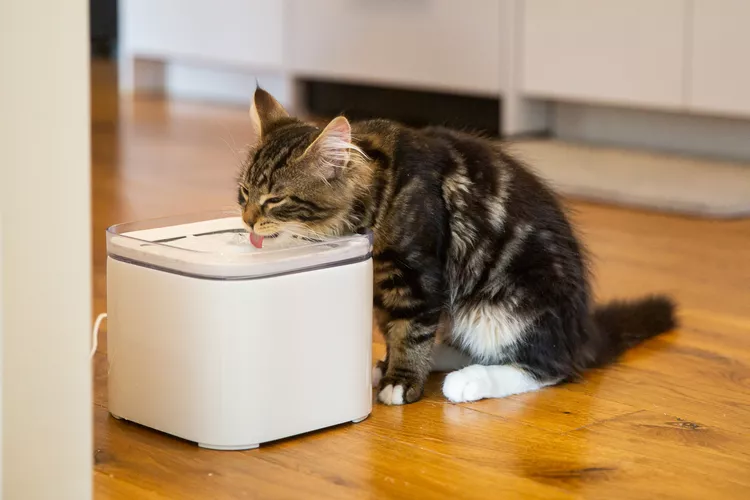
Cats need fresh drinking water every day for optimum health. Water is essential for helping the kidneys flush out toxins from the blood. Whether from illness or lack of fluids, dehydration in cats is dangerous, and if not treated, can lead to death.
Cats in kidney failure, either acute or chronic renal failure, often require extra fluids given either intravenously or by subcutaneous drip. The latter therapy is often carried out at home and is relatively easy to learn and perform. With most cats, the improvement after these treatments is significant and visible.
Excessive drinking of water can be a red flag for feline hyperthyroidism or feline diabetes. While cats may instinctively drink more during hot weather, it is important, as with all cats' habits, to know how much a cat drinks normally. If they suddenly start consuming large quantities of water and also shows other symptoms, an immediate veterinary consultation is indicated.
Cats' body tissues consist of about 67 percent water. Coincidentally, that is approximately the percentage of water in the prey they catch and eat in the wild. In contrast, dry cat food contains between 6 and 10 percent water and canned cat food has at least a 75 percent moisture content, making it a good source of water. Therefore, a cat on an all-dry food diet would require more supplemental drinking water than a cat on an exclusive raw or canned food diet. Likewise, a cat on a combination of dry and canned cat food also needs more drinking water.
Dr. Jennifer Coates, in an article for PetMd.com, created a formula suggesting that a 10-pound adult cat on a dry food diet needs about a cup of water a day. The same cat on a canned diet needs about a third a cup of water daily.

Everything You Need to Know About Raising Your First Cat
Whether you are thinking about getting a cat or just adopted your first one, these are the things to know to make your relationship a lasting one.
8 Ways To Help Your Cat Lose Weight
Cats who are at a healthy weight are happier, more agile, and tend to live longer. Here are 8 tips for managing a cat weight loss programme
Heart Disease in Cats
Like humans, cats can get heart diseases that may lead to serious problems. Learn all about symptoms along with the causes, treatment, and prevention.
Is Coconut Oil Safe for Cats?
Coconut oil is touted as a miracle food. Can coconut oil improve your cat's health? Is coconut oil even safe for cats?
Taurine for Cats
Taurine is an essential animal protein in your cat's diet. Learn more about the various ways it supports your feline's body.
Can Cats Eat Peanut Butter?
Peanut butter is not toxic to cats, but it might not be the best choice of treat for them.
Why Do Cats Stare at Walls?
Cats can have some quirky behaviors, including staring at walls. Why do cats do this and when should you be concerned?
Patellar Luxation in Dogs
If your dog has a knee that seems to pop out of place, it may have a patellar luxation. Find out what this means and what can be done about it.
13 Signs of Cancer in Dogs
The signs of cancer in dogs may include lumps and bumps, lethargy, vomiting, diarrhea, pain, abdominal swelling, and more. Signs may be mild or obvious depending on the type of cancer and its severity. Learn common signs of cancer in dogs so you’ll know when to call the vet.
Ear Mites in Puppies and Dogs
Ear mites can be a big discomfort for puppies and dogs. Learn about the causes, treatment, and prevention to keep mites away from your pets.
Why Do Dogs Eat Dirt?
Some dogs eat some strange things. What does it mean if your dog eats dirt and when should you be concerned?
200 Tortoiseshell Cat Names for Your Bi-Colored Kitty
Tortoiseshell cats are a rare phenomenon and deserve a fitting name. We've pulled together 200 tortoiseshell cat names, including male names, female names, cute names, and names inspired by their coat color and pattern.
How to Manage Your Cat's Claws
Here are ways you can help your cat maintain healthy claws while protecting your furniture at the same time.
Hair Loss in Cats
Hair loss in cats is a common problem with many possible causes. Learn the causes, treatments, and prevention of hair loss in cats, also known as alopecia.
Neurological Disorders in Cats
Neurological disorders in cats range from minor to serious. Any neurological condition is a major disruption to your cat's central nervous system. Learn the causes, treatment, and prevention of neurological disorders in cats.
Hair Loss on Hind Legs in Cats
Cats experience hair loss on their hind legs for a variety of reasons. Learn about potential causes, treatments, and ways to prevent it.
Can Cats Have Milk? Why They Really Shouldn’t Drink The Stuff
Despite what we’ve learned from pop culture, cats shouldn’t drink milk as most cats are lactose intolerant. Learn more about feeding milk to cats and alternatives you can feed your cat instead.
Can Cats Eat Dog Food?
Can cats eat dog food? In small amounts, it's unlikely to be a problem, but long-term feeding of dog food to cats can cause health issues and malnutrition.
Why Some Black Cats Look Different in the Sun
Some black cats look different in the sunlight. Whether it's cat genetics, a mutation, or a summer "rust," learn why they appear to have another coat.
Training Your Fearful Cat to Be Confident
Cats can become scared for any number of reasons. Learn about techniques that can help your fearful cat and reduce its anxiety so kitty lives a happy life.